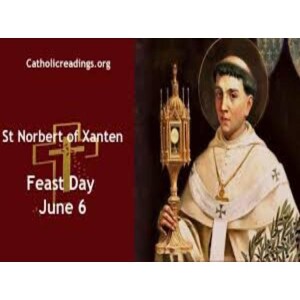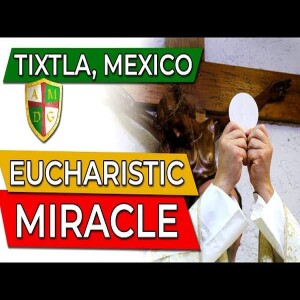Episodes

Friday Jun 07, 2024
Friday Jun 07, 2024
The Importance for Catholic Leadership from leaders.
I believe that any good leader, religious, political, military, family, whatever setting, these are some good common sense principles to help people in their leadership potential. If we apply these principles then hopefully, with the help of the Holy Spirit, we can make a difference.
1 Peter 4:10-11 states, "As each has received a gift, employ it for one another, as good stewards of God's varied grace: whoever speaks, as one who utters oracles of God; whoever renders service, as one who renders it by the strength which God supplies; in order that in everything God may be glorified through Jesus Christ. To him belong glory and dominion for ever and ever. Amen."
I have been asked the question that if you don't love yourself, how can you love others? This is the basic point St. Paul makes that Husbands love their wife as they represent Christ and the Church. (Ephesians 5:25) It also follows closely the golden rule, "So whatever you wish that men would do to you, do so to them; for this is the law and the prophets." (Matthew 7:12)
With this in mind, we should always take self inventory looking to improve our potential, knowing and learning our Faith. The eleven principles:
Know yourself and seek self-improvement.Be technically and tactically proficient.Develop a sense of responsibility among your subordinates.Make sound and timely decisions.Set an example.Know your people and look out for their welfare.Keep your people informed.Seek responsibility and take responsibility for your actions.Ensure assigned tasks are understood, supervised, and accomplished.Train your people as a team.Employ your team in accordance with its capabilities.

Thursday Jun 06, 2024
Thursday Jun 06, 2024
Stand In The Gap With Us St. Norbert of Xanten is the patron saint of priests and peace. This designation stems from his life as a priest, his commitment to fostering peace and reconciliation, and his deep devotion to God.
He had a reputation for being a skillful and inspiring preacher and was also a person who tried to make peace between the many warring princes and people of the time, even to having his life threatened.
In the 12th century in the French region of Premontre, Saint Norbert founded a religious Order known as the Praemonstratensians or the Norbertines. His founding of the Order was a monumental tasks: combating rampant heresies—particularly regarding the Blessed Sacrament, revitalizing many of the faithful who had grown indifferent and dissolute, plus effecting peace and reconciliation among enemies.
Norbert entertained no pretensions about his own ability to accomplish this multiple task. Even with the aid of a goodly number of men who joined his Order, he realized that nothing could be effectively done without God’s power.
Norbert of Xanten (c. 1075-1134) was a nobleman, courtier, ascetic, legendary peacemaker, and an exemplar of the apostolic way of life; he was a priest of the Catholic Church who founded the Norbertine order in the 12th century. He built the order on the basis of love, selfless sharing and radical hospitality.

Thursday Jun 06, 2024
Thursday Jun 06, 2024
Vigilance In The Face of Chaos. Jesus said to his disciples: “There will be signs in the sun, the moon, and the stars, and on earth nations will be in dismay, perplexed by the roaring of the sea and the waves. People will die of fright in anticipation of what is coming upon the world, for the powers of the heavens will be shaken. And then they will see the Son of Man coming in a cloud with power and great glory.
But when these signs begin to happen, stand erect and raise your heads because your redemption is at hand. Beware that your hearts do not become drowsy from carousing and drunkenness and the anxieties of daily life, and that day catch you by surprise like a trap. For that day will assault everyone who lives on the face of the earth. Be vigilant at all times and pray that you have the strength to escape the tribulations that are imminent and to stand before the Son of Man.”
While listening to the Gospel reading this morning, I was struck with the warning about the signs in the heavens, the sun, moon, stars, and how the world will go into a chaos.
The world will be “perplexed by the roaring of the sea and the waves”.

Wednesday Jun 05, 2024
Wednesday Jun 05, 2024
Stand In The Gap With Us And Saint Boniface 6/5/2024. Boniface, who was baptized Winfrid, lived in the eighth century. He was a brilliant monk in a Benedictine monastery in England. He was the head of a school, but he thought God wanted him to be a missionary. He went to Frisia (Northern Netherlands and Germany) to begin his work.
Boniface is known as the “Apostle of Germany” for his tremendous missionary efforts spreading the faith through that region of Europe during the Dark Ages. He was born in England in 680, and baptized with the name Winfrid. At the age of 5, he had his first encounter with educated monks when several visited his home.
Boniface, known as the apostle of the Germans, was an English Benedictine monk who gave up being elected abbot to devote his life to the conversion of the Germanic tribes. Two characteristics stand out: his Christian orthodoxy and his fidelity to the pope of Rome.
How absolutely necessary this orthodoxy and fidelity were is borne out by the conditions Boniface found on his first missionary journey in 719 at the request of Pope Gregory II. Paganism was a way of life. What Christianity he did find had either lapsed into paganism or was mixed with error. The clergy were mainly responsible for these latter conditions since they were in many instances uneducated, lax and questionably obedient to their bishops. In particular instances their very ordinations were questionable.

Wednesday Jun 05, 2024
Wednesday Jun 05, 2024
Pinch of Salt How to season the World Around You! “You are the salt of the earth. But if salt loses its taste, with what can it be seasoned? It is no longer good for anything but to be thrown out and trampled underfoot. You are the light of the world. A city set on a mountain cannot be hidden. Nor do they light a lamp and then put it under a bushel basket; it is set on a lampstand, where it gives light to all in the house. Just so, your light must shine before others, that they may see your good deeds and glorify your heavenly Father."
A Pinch of Salt is an example of being a seed planter when the opportunity comes your way. It is fantastic when you have the opportunity to Sponsor someone into the Catholic Faith. That is very important to be in service to help those investigating the Church. It is a journey that we take with converts and many times I have heard people grow in their faith by being a Sponsor.
However, to be a seed planter, you might find yourself talking with someone who might not have been to Mass in many years, you might meet someone who has not received any of the Sacraments for a long time. You might find yourself talking to someone who has left the Church and joined another. There are a thousand situation you can come across. Most of these times you might run into someone in a chance meeting that occurs only one time.
Recently I took my cat into a local pet store that does clean up and cuts fir and as I was waiting for my cat, I met a lady in the parking lot. Striking up a conversation with her, she was raised a Catholic from Mexico but today she was following a Non-Denominational group. She apparently married into it. After five minutes I was able to share why the Catholic Faith was and is the true Church. She had issues with Saints and I was able to explain the Churches position and the importance. All I could do was to offer a Pinch of Salt and hope that the seed planted would take root.

Tuesday Jun 04, 2024
Tuesday Jun 04, 2024
Stand In The Gap With Us And Blessed Angelina of Marsciano 6/4/2024. Blessed Angeline founded the first community of Franciscan women other than Poor Clares to receive papal approval. Angeline was born to the Duke of Marsciano near Orvieto. She was 12 when her mother died. Three years later, the young woman made a vow of perpetual chastity.
The first words Blessed Angelina of Marciano uttered were the holy names of Jesus and Mary. She delighted in building little altars, which she decorated tastefully, and around which she would gather other girls of her age to pray and sing.
Blessed Angeline founded the first community of Franciscan women other than Poor Clares to receive papal approval.
Angeline was born to the Duke of Marsciano near Orvieto. She was 12 when her mother died. Three years later, the young woman made a vow of perpetual chastity. That same year, however, she yielded to her father’s decision that she marry the Duke of Civitella. Her husband agreed to respect her previous vow.
Blessed Angelina lost her mother when she was but 12 years of age. Her attachment to Jesus Christ then became more intimate and she vowed perpetual chastity. Blessed Angelina had scarcely reached the age of 15 when her more worldly-minded father told her that he wanted her to marry the duke of Civitella. Angelina declared that she wished no other than her heavenly Bridegroom, Jesus Christ.

Tuesday Jun 04, 2024
Tuesday Jun 04, 2024
On October 21, 2006, the effusion of a reddish substance was noted from a consecrated Host during the Eucharistic Celebration at Tixtla, in the Diocese of Chilpancingo-Chilapa. The Bishop of the place, Most Reverend Alejo Zavala Castro, then convened a Theological Commission of investigation and, in October 2009, he invited Doctor Ricardo Castañón Gómez, to take on the leadership of the program of scientific research whose purpose was in fact that of verifying the said event. The Mexican Ecclesiastical authorities turned to Doctor Castañón Gómez because they were aware that, in the years 1999-2006, the scientist had conducted some studies on two consecrated Hosts that also bled in the Parish of Saint Mary, in Buenos Aires.
The Mexican case starts in October 2006, when Father Leopoldo Roque, pastor of the Parish of Saint Martin of Tours, invites Father Raymundo Reyna Esteban to lead a spiritual retreat for his parishioners. As Father Leopoldo and another priest were distributing Communion, assisted by a religious sister who was to the left of Father Raymundo, this latter one turns towards him with the “pix” containing the Sacred Particles, looking at Father with eyes filled with tears, an incident that immediately attracted the attention of the celebrant: the Host that she had taken to give Communion to a lady parishioner had begun to effuse a reddish substance.

Monday Jun 03, 2024
Monday Jun 03, 2024
Stand In The Gap With Us And Saint Charles Lwanga and Companions 6/3/2024. In our time with the confusion being sent out by the woke agenda leading our youth down into perdition.
Charles Lwanga (Luganda: Kaloli Lwanga; 1 January 1860 – 3 June 1886) was a Ugandan convert to the Catholic Church who was martyred with a group of his peers
In 1879, when Catholic missionaries arrived in the country, their strong witness inspired Lwanga to convert to Catholicism.
Charles Lwanga was burnt alive and martyred for his faith on June 3rd 1886, along with other Catholics. Pope Paul VI canonized him and his companions in 1964. St. Charles Lwanga was born in 1860 in the Kingdom of Buganda in the southern part of modern Uganda.
Charles Lwanga is the patron of youth and Catholic action in most of tropical Africa.
One of 22 Ugandan martyrs, Charles Lwanga is the patron of youth and Catholic action in most of tropical Africa. He protected his fellow pages, aged 13 to 30, from the homosexual demands of the Bagandan ruler, Mwanga, and encouraged and instructed them in the Catholic faith during their imprisonment for refusing the ruler’s demands.
Charles first learned of Christ’s teachings from two retainers in the court of Chief Mawulugungu. While a catechumen, he entered the royal household as assistant to Joseph Mukaso, head of the court pages.

Monday Jun 03, 2024
Monday Jun 03, 2024
Join John Carpenter, Don Hartley, and the Deeper Truth research team as they review more apparitions coming from another part of Belgium in 1933.
Mary told Mariette that the spring was set apart for her (Mary), for all the nations, and for the sick. Again, similar to Beauraing, Mary makes a bold claim in Banneux where she said, “I come to relieve the sick” and “I come to relieve suffering.” Further, Mary told Mariette, “Have faith in me…
Mariette Beco was 12 and a half years old when she reported Marian apparitions in 1933 in Banneux,
It is understandable that Mary would appear in Belgium in the early 1930's because she was the main talk in French and Belgian towns, each with mother figures that are symbols of Pietà. There was lots of economic issues for children, and an anti-Catholic state was across the land known as the Nazi state.
Ten miles from Liege, in the plateau hamlet of Banneux. The family was not a pious one. The 15th of January was a Sunday and 11-year-old Mariette, the eldest of the siblings, missed Mass (it seems this was an ordinary occurrence in this family). The Beco family was poor (by Belgian standards) and their 4-room house would later be the cramped quarters for a family of eleven. Mariette Beco was the oldest, born on March 25, 1921 (the feast of the Annuncation coincided that year with Good Friday). At 11 years old, the eldest of seven children, she was not intelligent, yet she was not stupid. She did very badly in Catechism Class.

Sunday Jun 02, 2024
Sunday Jun 02, 2024
Stand In The Gap With Us And Saints Marcellinus and Peter 6/2/2024. Saints Marcellinus and Peter, you bravely laid down your lives for the sake of the Gospel and, in doing so, spiritually befriended all those who would be inspired by your witness.
Saints Marcellinus and Peter were early Christian martyrs whose courage in the face of death has inspired many Christians for centuries. Their names are invoked in the Roman Canon each time the Mass is said, and they are included in the Eucharistic Prayer. They are also celebrated on their own feast day.
It was at the mid-point of this persecution, around 303, that a Roman exorcist by the name of Peter was imprisoned for his faith. While in prison, tradition holds that Peter freed Paulina, the daughter of the prison-keeper Artemius, from demonic influence by his prayers.
This demonstration of Christ's power over demons is said to have brought about the conversion of Paulina, Artemius, his wife, and the entire household, all of whom were baptized by the Roman priest Marcellinus.
The catacomb of Saints Marcellinus and Peter derives its name from the two martyrs buried within it. The story behind the life of these two martyrs goes back to the time of the Emperor Diocletian. St Marcellinus and St Peter were slain during the persecution of 304 AC - beheaded, in Rome.
Pope Damasus I claimed that he heard the story of these two martyrs from their Sts. Marcellinus and Peter
Damasus states that they were killed at an out-of-the-way spot by the magistrate Severus or Serenus, so that other Christians would not have a chance to bury and venerate their bodies.
